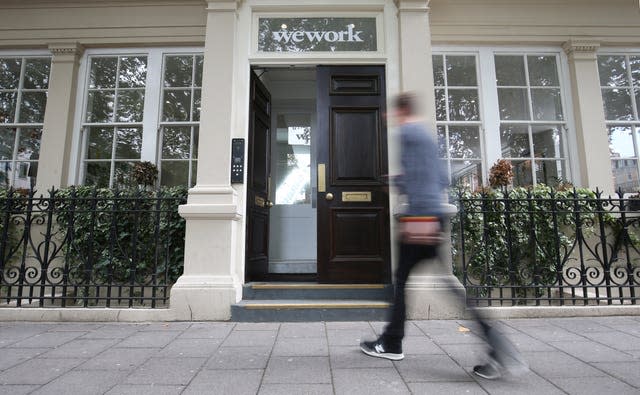WeWork shares plunge on reported plans to file for bankruptcy
WeWork has seen shares plunge in after-hours trading following reports that the troubled flexible office-sharing firm is preparing to file for bankruptcy.
The US-listed group saw shares tumble by more than a third in extended trading overnight after it was reported it is planning to seek a so-called Chapter 11 bankruptcy protection order as early as next week.
Filing for a Chapter 11 bankruptcy means a company intends to reorganise its debts and assets to have a fresh start, while remaining in business.
WeWork declined to comment on what it said is “speculation”.
The New York-based group has been struggling with a huge debt pile and mammoth losses and has already seen its share price decimated, falling around 96% this year.

Earlier on Tuesday, WeWork said it had entered into an agreement with creditors for a temporary postponement of payments for some of its debts after skipping interest payments earlier this month and with the grace period soon to end.
The firm had already warned in August that it faced “substantial doubt” over its ability to continue as a going concern.
At the time it blamed the difficult US commercial property market and a weaker-than-expected performance.
America’s real estate sector is suffering due to soaring borrowing costs after the US central bank has moved to hike interest rates to curb inflation.
WeWork has also seen an exodus of top management, with former chief executive Sandeep Mathrani quitting earlier this year. He was replaced by David Tolley.
WeWork has nearly 50 sites in the UK and Ireland.
The group has suffered a stark reversal of fortunes since being valued at 47 billion US dollars (£38.7 billion) in 2019 and revealing plans for a stock market listing that same year.
The company – backed by Japanese tech investor SoftBank – was hit by investor worries over its losses and scepticism over its fundamental business model, which sees it take out long-term leases and then rent them out for the short term.
It finally floated in 2021, but for a far lower valuation and has struggled to get its finances on track, despite SoftBank pumping in tens of billions of dollars to help prop up the firm.


